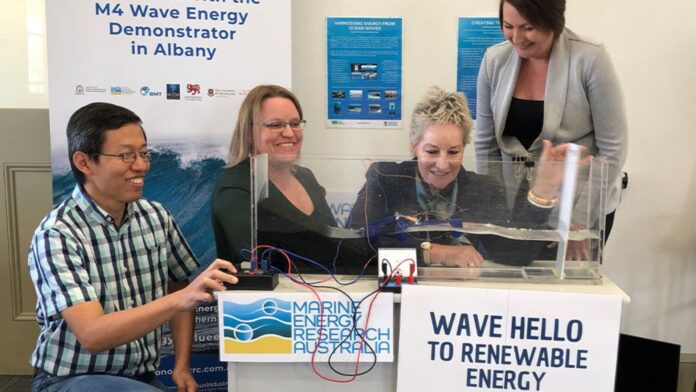
Two newly published reports describing the Great Southern region’s superior offshore energy resource and the “Value in Waves” for Western Australia‘s (WA) future economy are supporting Albany’s potential to become a superpower in capturing renewable energy from oceans.
As part of the WA Parliamentary Research Program (PRP), post-graduate researcher Lucy Wang of The University of Western Australia‘s Marine Energy Research Centre (MERA) presented the advantages of adding wave energy to the renewables mix and its long-term cost-competitiveness.
The work modelled the structure and operation of a renewable energy system on the WA south coast using solar, onshore wind, and wave energy input to meet customer demand throughout the year, according to MERA centre manager Dr Wiebke Ebeling at the UWA Albany Campus.
“It concluded that the consistency and predictability of waves make the Albany region a promising site to advance wave energy as a clean baseload energy source in resilient renewable energy grids of the future that can reduce the need for battery storage and overcome intermittency issues,” Dr Ebeling said.
The M4 technology, also known as Moored MultiModal Multibody, was used in the PRP project to compare wave energy production in the Southern Ocean off Albany to that at the European Marine Energy Centre in northern Scotland, the centre of the world’s wave energy industry.
Dr Ebeling stated that the $3.47 million Albany sea trial, which will design, construct, deploy, run, and recover a scaled-down M4 wave energy converter in King George Sound, will support MERA’s research and represent a significant step forwards for Australia.
“Funded by the Blue Economy Cooperative Research Centre, WA government and UWA, this project will make all data publicly available to advance the entire industry sector- a point of difference to projects around the world where commercial sensitivities limit knowledge sharing,” Dr Ebeling added.
According to Dr Ebeling, the M4 project will confirm their simulations and hypotheses to prove Albany’s ability to generate considerable amounts of renewable energy from ocean waves, benefiting nearby clients, including the Albany Shellfish Hatchery and the Historic Whaling Station.
Dr Ebeling commended recently retired Regional Development Minister Alannah MacTiernan for her assistance in establishing an ocean energy knowledge centre in regional WA through MERA and her mentoring of Ms Wang through the Parliamentary Research Program.
She stated that the inaugural Postgraduate Summer School of the Blue Economy CRC would focus on UWA’s maritime research facilities in the Great Southern and Albany’s prospective wave energy locations next week.
“A cohort of 30 participants, mostly postgraduate research students from across the country and young industry professionals from Perth, will enjoy a busy program of lectures, fieldwork, cultural and stakeholder engagement on the WA south coast,” she said.




















